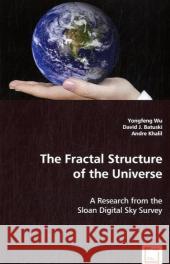The Fractal Structure of the Universe » książka
The Fractal Structure of the Universe
ISBN-13: 9783639036299 / Angielski / Miękka / 2008 / 80 str.
The fractal dimension of the spatial distribution of galaxies can be characterized by various statistical and topological methods, such as the Two-point Correlation Function, Perimeter-Area, Box Counting, and the Gamma Function. Here we develop a new way to get fractal information, that is the Metric Space Technique (MST). It allows multi-ple measures to be simultaneously applied for quantitative analysis of any type of structure distribution. All such distributions are considered to be elements of multi-parameter space, and the analysis is based on considering output functions, which characterize the distributions in multi-parameter space. We also develop both the Box Counting and Perimeter-Area method with the Hexagon Cell technique to calculate the fractal dimension of our samples. We compare results from Sloan Digital Sky Survey Data Release 5 with that of mock samples of ga-laxies from N-body simulation, nested-pairs simulations and random catalogs. By systematically studying hundreds of thousands of ga-laxies, we demonstrate that in the local universe there exists a fractal structure from MST. We also discuss the possible improvement for mock samples.
The fractal dimension of the spatial distribution of galaxies can be characterized by various statistical and topological methods, such as the Two-point Correlation Function, Perimeter-Area, Box Counting, and the Gamma Function. Here we develop a new way to get fractal information, that is the Metric Space Technique (MST). It allows multiple measures to be simultaneously applied for quantitative analysis of any type of structure distribution. All such distributions are considered to be elements of multi-parameter space, and the analysis is based on considering output functions, which characterize the distributions in multi-parameter space. We also develop both the Box Counting and Perimeter-Area method with the Hexagon Cell technique to calculate the fractal dimension of our samples. We compare results from Sloan Digital Sky Survey Data Release 5 with that of mock samples of galaxies from N-body simulation, nested-pairs simulations and random catalogs. By systematically studying hundreds of thousands of galaxies, we demonstrate that in the local universe there exists a fractal structure from MST. We also discuss the possible improvement for mock samples.











